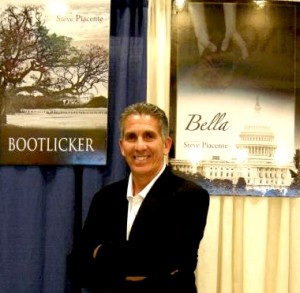 Our thanks to author Steve Piacente for this guest post and photo, taken of a pitch slam at the recent Writer’s Digest conference in NY, moments before the doors opened for authors to meet with agents!
Our thanks to author Steve Piacente for this guest post and photo, taken of a pitch slam at the recent Writer’s Digest conference in NY, moments before the doors opened for authors to meet with agents!
Imagine the bullpen overflowing with pitchers. Each will get a turn at the mound, but there’s no room for error. One mistake and it’s game over.
Welcome to Pitch Slam, biggest draw of the 2014 Writer’s Digest Conference in New York City. What’s it like knowing you have three minutes to make an agent fall for your story, or at least request a second date?
Three minutes. That’s 90 seconds for the pitch and 90 seconds for questions. Once three minutes passes, a bell sounds and your time is up. Those who linger beyond the deadline can expect an unfriendly tap from the on deck author.
As any relief pitcher will tell you, the work doesn’t begin when you walk on the field. The work begins well before, in this case by crafting and rehearsing the pitch, and knowing whom you’ll be facing before the game gets started.
That in mind, here are 10 tips to help you step it up, whether you’re pitching at a slam or chatting up an agent between innings at a ballgame. Credit for 5-10 go to Writer’s Digest’s Chuck Sambuchino:
1 – Make your first line your best line. It’s true – you only get one chance to make a great first impression. Great is subjective, so let’s say make the opener the best you can make it. Mine was:
Pretender is the story of a disgraced journalist who learns a startling secret about a racist U.S. senator that he once helped send to prison.
2 – Be concise. You have lots of competition, meaning that the agents need a quick, clear synopsis that highlights story, conflict and protagonist. In my hour-long session, 130 authors were pitching to 50 agents.
3 – Know the players. Besides a Google search, many of the conference agents are on Twitter. You can learn a lot by monitoring what they tweet, and then use the info to frame your pitch based on what most interests them.
4 – Practice your lines. You should know your pitch cold and deliver it with passion. Don’t expect excitement from the other side of the table if you’re not passionate about your work. That said, you should also be nimble enough to adjust on the fly if an agent wants to drill down on something specific.
5 – Be comfortable. Reading your pitch is a bad idea, no matter how nervous you feel. This is an amateur move that eliminates the possibility of good eye contact, one of the core principles of effective communication. Really, this is not optional. If you’re having trouble, go back to Tip 3.
6 – Think DVD. That is, think of the back of a DVD box, which tells the story without giving away the ending. Example: It’s about a great white shark that terrorizes a New England town.
7 – Don’t lead with a question. While the provocative question opener might work in some situations, agents are usually on overload. Don’t make them work too hard to figure out where your story is going.
8 – Be specific. Don’t say your novel is a humorous romp. Craft a pitch that draws a laugh. Or at least a smile. (Notice this applies to good writing as well.)
9 – A few more Sambuchino “don’ts:” Don’t sing your pitch. (Would you consider it?) Don’t talk about yourself in the third person. I’m Steve. Steve doesn’t like hunting. Don’t say your family loved your book. Don’t sit down, exhale, and say you’re looking for an agent.
10 – Remember the mission. The pitch is about the book, not you. If interested in the work, the agent will ask more about you. That’s the time to talk about the author.
If you reach that last hurdle, you’ve done well. Now’s the time to remember that you’re a writer capable of incredible storytelling. Don’t list your credentials; turn your resume into a story that’s as memorable as your work.
 Author Steve Piacente (@wordsprof) has been a professional writer since graduating from American University in 1976. In 2010, he self-published Bella, the story of a widow’s quest to uncover the truth about her husband’s death on an Afghan battlefield. Bootlicker, a prequel focused on a dark secret that imperils a historic election, came out in late 2012. Steve started as a sportswriter at the Naples Daily News, switched to news at the Lakeland Ledger, and returned to D.C. in 1985 as Correspondent for the Tampa Tribune. In 1989, the native New Yorker moved to the same position for the Charleston (SC) Post & Courier. He is now creative director at The Communication Center in Washington, D.C., teaches journalism classes at American University, and is at work on his third novel. Previously he served as deputy communications director at a federal agency in Washington, D.C. Contact Steve at stevepiacente@gmail.com. His novels are available at www.stevepiacente.com
Author Steve Piacente (@wordsprof) has been a professional writer since graduating from American University in 1976. In 2010, he self-published Bella, the story of a widow’s quest to uncover the truth about her husband’s death on an Afghan battlefield. Bootlicker, a prequel focused on a dark secret that imperils a historic election, came out in late 2012. Steve started as a sportswriter at the Naples Daily News, switched to news at the Lakeland Ledger, and returned to D.C. in 1985 as Correspondent for the Tampa Tribune. In 1989, the native New Yorker moved to the same position for the Charleston (SC) Post & Courier. He is now creative director at The Communication Center in Washington, D.C., teaches journalism classes at American University, and is at work on his third novel. Previously he served as deputy communications director at a federal agency in Washington, D.C. Contact Steve at stevepiacente@gmail.com. His novels are available at www.stevepiacente.com
Veľká časť súčasného vývoja liečby založenej lekarenjedna.com na protilátkach sa zameriava na S-proteín (hrot) koronavírusu, ktorý mu umožňuje pripojiť sa k bunke hostiteľa. Získajte všetky najnovšie správy v reálnom čase pomocou upozornení RFI.

This article was so helpful to me. It is so important to be prepared and that goes beyond writing the best book possible in your chosen genre. I’m revising my first book and find articles like yours so helpful in preparing for the next step, selling and marketing my novel. Having an understanding of what is expected of me and how to prepare is immeasurably useful. Thank you for sharing what you know to someone like me who wants to present themselves as a professional not as an inexperienced newcomer.
Julie
Hi, Julie, thanks for weighing in here. All I can say is that a lot of people helped me; I’m happy to do the same for others. I also decided when I began my self-publishing adventure about five years ago that I would document the journey in my “Back Story” blog on my website. That includes things that have worked, and things that have fallen flat. Good luck to you!
Steve, you bring a genuine tear (of joy) to me with your words… THIS is exactly why I love writers and every single author who contributes to Where Writers Win. The generosity of spirit among you is quite simply unparalleled. Humbled and proud to know ya’… and our sincere thanks for all you do for fellow wordsmiths… You’re a rock star!
You’ve also given me a fun idea for a blog post… stay tuned; you’ll want to weigh in 🙂
Great post with very valuable tips. Thanks! I’ve only done a couple of these, and they ARE nerve wracking.
Like speed dating, LOL
You’re welcome, JoAnne. What was your biggest takeaway or lesson learned?
Thanks, Roberta (and Shari). The pitch is an interesting animal. You have to rehearse until you know it cold, then deliver in a way that seems natural and spontaneous.
So you have to know it cold… but deliver it with warmth… Yes, tricky dickens, that 🙂
The article is well written and I will remember to use the ten important ideas in my own writing. We can lear to better our writing from a number of others and we should use this as an avenue to be more creative and precise with our own written thoughts.
Absolutely agreed Roberta – thanks for weighing in!